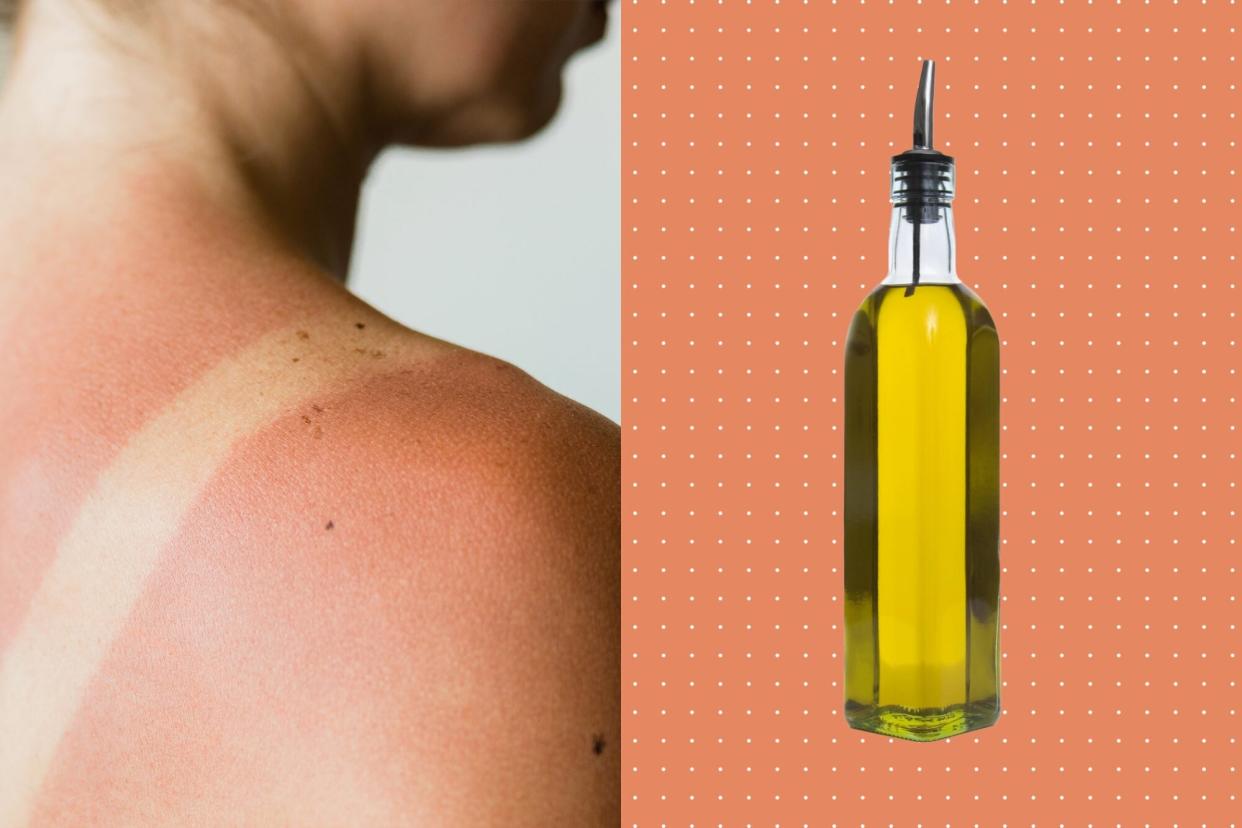Can Drinking or Eating Olive Oil Help Heal Your Sunburn?

Getty Images
As the extreme heat continues across the country this summer, those of us who need or like to spend time outdoors sometimes suffer the consequences of sunburns, despite our best efforts with SPF creams and sun-protective clothing. However, one of the easiest ways to help heal your sore or damaged skin might be in your kitchen, rather than your medicine cabinet.
Olive oil is loaded with healthy nutrients, including essential fatty acids such as oleic, palmitic and linoleic acids that can help keep your skin looking sleek. As both an occlusive and a moisturizer, olive oil coats and protects the skin, keeping its moisture locked inside while also softening its exterior. Additionally, olive oil contains vitamins E and K, which help heal the skin and prevent scarring.
Topically Applying Olive Oil to Sunburns
Thanks to the vitamins and nutrients it contains, applying topical olive oil may help reduce bubbling or peeling skin after a sunburn. "Olive oil is a traditional remedy for sunburn and other skin lesions, probably due to both the fatty acids and the anti-inflammatory components. A 2016 study demonstrated that burns treated with olive oil healed faster than untreated burns," functional medicine doctor and nutrition specialist Stacie J. Stephenson, D.C., CNS, says. "If you have a mild sunburn that doesn't need medical attention, try applying extra-virgin olive oil lightly to the burned area and relax for about 30 minutes while rehydrating with a big glass of water. This will allow the olive oil to soak in without getting all over everything you touch."
Drinking or Eating Olive Oil for Sunburns
Interestingly, you may not have to smell like salad dressing to reap olive oil's skin benefits. Instead, try drinking or eating it, which might help improve skin's appearance and even relieve pain after a sunburn.
"Researchers believe that the anti-inflammatory benefits of olive oil are due to organic compounds called polyphenols, especially oleocanthal, which may have an anti-inflammatory effect and a pain-relieving effect, similar to ibuprofen," says Stephenson, who's author of the book Vibrant: A Groundbreaking Program to Get Energized, Own Your Health, and Glow. Research studies support the analgesic (AKA pain relieving) and anti-inflammatory effects of olive oil as well. "Oleocanthal and other phenolic compounds in olive oil can help to control inflammation both externally on a sunburn and internally, by suppressing inflammatory agents in the body and supporting the beneficial bacteria in your gut." Research in the journal Nutrients found that along with reducing bodily inflammation, olive oil helped stimulate greater biodiversity of healthy gut bacteria, which can improve overall gut health.
In fact, olives are one of the foods with the highest polyphenolic content per serving. According to a 2018 study, eating olive oil may not only help protect the body against oxidative stress, but it may also help support a healthy immune system in a number of ways.
And a January 2022 study found that patients with lymphocytic leukemia who ingested high daily doses of olive oil (about 1 1/2 ounces per day) reduced the number of cancer cells in their body and improved their metabolism. Though these findings are impressive, the study was very small and more research is needed to see if the same results would be true for larger populations or other types of cancers, such as skin cancer.
The Bottom Line
Thus people who work outdoors or vacationers who have overindulged in the sun might want to help themselves to a heaping bowl of salad with a generous drizzle of olive oil. You can also use it as a dip for vegetables or bread to easily up your intake. There are plenty of other reasons to consume more olive oil, too. It can reduce inflammation, lower cancer risk, promote healthy aging and improve heart health. On top of all of that, it might even help with a sunburn, whether you apply it topically or ingest it. However, while it's packed with health benefits, it's best not to overindulge as olive oil (like all oils and healthy fats) is a calorie-dense food.
That said, research suggests consuming extra-virgin olive oil above other kinds of olive oil if you can. While any olive oil is healthy, extra-virgin olive oil is processed the least and retains the highest amount of polyphenols, especially oleuropein and hydroxytyrosol. Regular olive oil is usually heat-treated for taste and shelf life, which can alter the antioxidant content.

